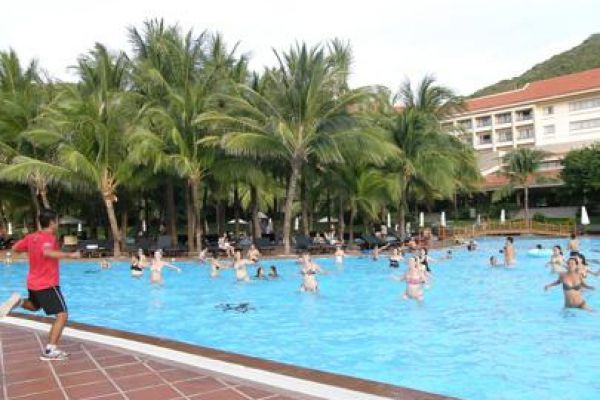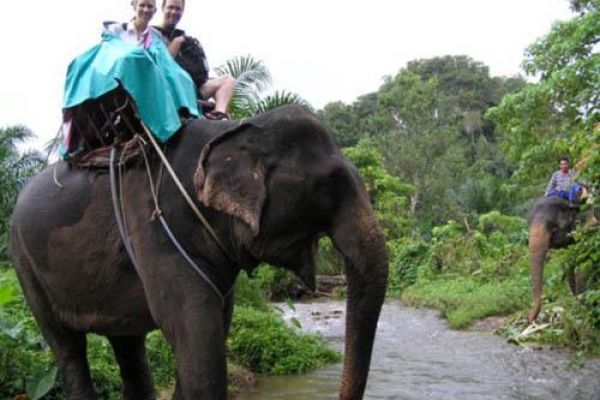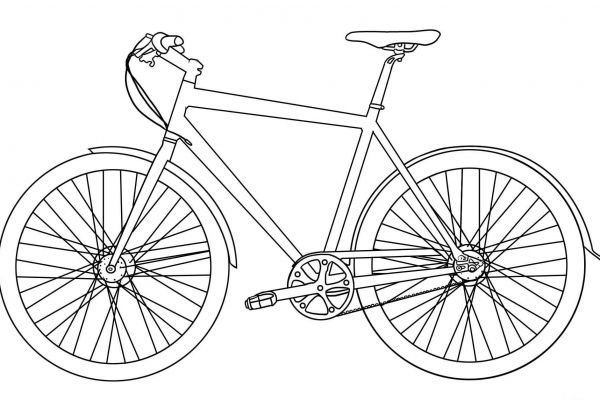The practice is simple: one simply places their feet and calves into a fish tank and enjoys the tingling bites from schools of tiny “massage fish,” which feed on their “prey’s” dead skin.
Fish massage at cafes
At a café that offers fish massage services on Truong Chinh Street in District 12, a group of local high school students arrived on a hot weekend for a 30-minute massage.
The students’ initial anxiety changed to intrigue and delight as they put their legs into the fish tank.
Instantly a school of thousands of tiny fish swarmed between their legs, enthusiastically ripping away the youths’ dead skin with their small, toothless mouths.
“It was quite tickly at first, and then it began to tingle curiously. We had a great time, having smoothies, making jokes, and watching the fish gently gnawing at our legs,” shared Thao, a member of the group.
According to attendant Thuy Vy, the tank is the café’s largest, home to over 7,000 fish.
“The fish’s sense of smell is particularly acute; one just needs to put their legs in the water for a few seconds before they swim over. The school can serve up to some hundred clients a day without slowing down a bit,” Vy said.
The attendant’s job involves serving drinks, watching over their clients, and making sure that they move their legs gently so as not to accidentally crush the fish to death.
A 30-minute massage session and a drink costs VND50,000 (US$2.4) each. Students get half-price discounts, so the venue is invariably packed on weekends.
Clients gather around the fish tanks, with their drinks placed on the edges of the tanks or on a small floating platform in the middle of the water.
Several local families have also chosen the place for weekend outings.
“My children told me to come here so that the fish will eat away all my peeling leg skin. The small creatures did an excellent job, and it was really fun,” said 70-year-old Tran Thanh, of Tan Binh District, who came with his grandchild.
A number of female clients also request a body fish massage, believing that dipping their bodies in the water and having the fish “sanitize” them some 40 minutes a week can help perfect their complexion.
Before doing so, clients must shower to cleanse themselves of all cosmetics and chemicals, which may poison and kill the fish.
Fish massage enters spas
A sign advertising “Fish Massage” is hung at spa B. on Dong Khoi Street in downtown HCMC, drawing attention from tourists, particularly foreigners.
The spa, which boasts two round fish tanks and some 2,000 fish, can serve up to 100 clients, mostly foreigners, a day.
Tourists at the spa enjoy dipping their feet in warm water and having them washed by the spa attendants before “falling prey” to the fish.
Attendants also make sure that clients do not have any open wounds or skin diseases.
“Many American and Australian tourists really love fish massage, as such services aren’t as popular in their countries. Several also ask to immerse their entire bodies in the water, but we don’t allow that. When the attendants aren’t looking, some even hold their breath and soaking their faces in the water for the fish to ‘massage’ them,” Nhat Linh, spa manager, said.
While the fish intensely work on clients’ legs, female masseuses massage their arms, shoulders, and necks.
Clients can also relax over hot ginger tea. The 30-minute massage package costs some VND210,000 ($10).
Kazuo Ito, a 29-year-old Japanese tourist, once took his 6-year-old daughter to the fish massage spa.
“My elder sister found the service relaxing during her trip to Vietnam and told everyone back in Japan about her rewarding experience. During our 4-day trip, my daughter insisted that I take her here,” said Ito, adding that the service is not so popular in Japan.
According to Vuong, manager of spa Z. on Bui Thi Xuan Street in District 1, the service requires painstaking care of the fish.
Fish massage enters homes
According to fish massage dealers in HCMC, to prevent sharing the tanks with others and risking their health, some people choose to install their own tanks at home.
La Nghia Hung, of Tan Hung Ward in District 7, one of the local major dealers, said that those with spacious houses and gardens prefer building cement tanks, while those with less space choose to have glass aquariums.
Such tanks cost some VND20-25 million ($1,179).
Hung also warned that on the local market, several types of fish are advertised as massage fish and fetch considerably high prices, some VND20,000-40,000 ($0.95-1.9) apiece, but not all of them are actually capable of massaging.
“Without careful inspection, one may buy Chinese anabas fish, which grow teeth when they are older. Their bites can be painful and cause bleeding,” he warned.
Healthful, but …
According to Dr. Nguyen Thi Dieu My, of HCMC-based Dermatology Hospital, just like any massage method, fish massage beneficially stimulates nerve ends, relieving stress and tension.
However, fish massage can directly transmit disease-carrying parasites to humans or serve as the medium of transmitting human-to-human diseases.
Dr. My stressed that though the risks do exist, they can be minimized if fish massage providers strictly comply with safety and hygiene procedures.
They can also arrange separate tanks for those suspected of having transmittable diseases.














